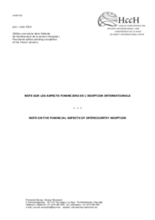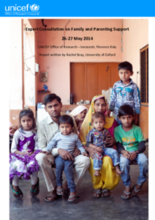Displaying 611 - 620 of 947
To address the issues related to the financial aspects of intercountry adoptions, the Hague Convention initiated an Experts’ Group, which met in October 2012 and produced nine Conclusions and Recommendations, which they brought to the Permanent Bureau to publish as a “Note”.
This presentation from Innocenti’s Expert Consultation on Family and Parenting Support describes Promundo’s approach to engaging men as fathers and caregivers of children.
This presentation from Innocenti’s Expert Consultation on Family and Parenting Support focuses on parenting interventions for the wellbeing of children and families in an HIV/AIDS context.
This presentation from Innocenti’s Expert Consultation on Family and Parenting Support describes gender roles in parenting in Ethiopia, the missing role of fathers in parenting, legal/policy provisions of family support, and some work being done to engage fathers.
This presentation from Innocenti’s Expert Consultation on Family and Parenting Support includes an overview of family trends in the CEE/CIS region, some promising practices in social protection, and thoughts for going forward.
This presentation from Innocenti’s Expert Consultation on Family and Parenting Support discusses a study on the impact of Adverse Childhood Experiences (ACEs) on brain development.
This presentation from Innocenti’s Expert Consultation on Family and Parenting Support discusses family separation, including the factors leading to it, global data on children’s living situations and how it relates to preventing separation.
This presentation from Innocenti’s Expert Consultation on Family and Parenting Support focuses on the risks facing, and the needs of, poor families in Brazil.
This presentation from Innocenti’s Expert Consultation on Family and Parenting Support provides an overview of the National Approach to Parenting in Jamaica and the lessons learned from the program.
This report includes an outline of the discussion, activities, and conclusions from a two-day expert consultation on family and parenting support, organized by Innocenti, the UNICEF Office of Research.


